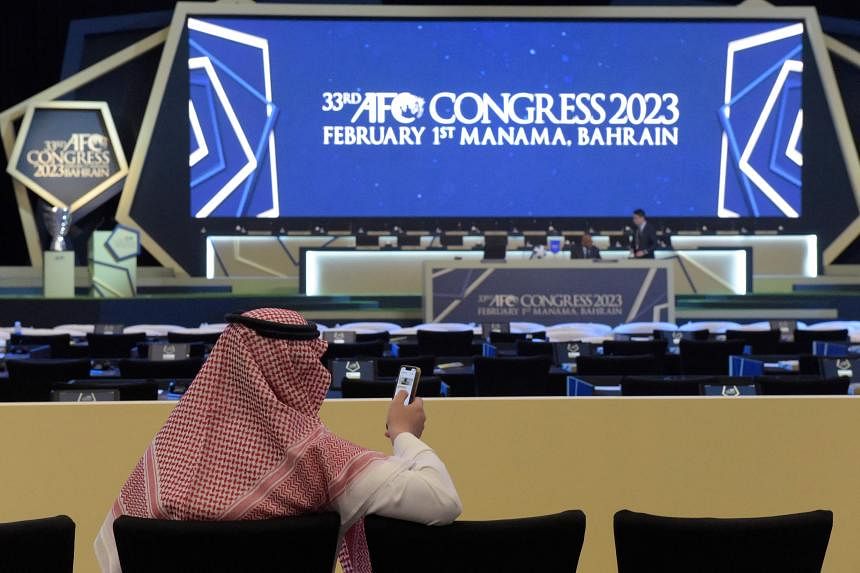MANAMA, Bahrain – Saudi Arabia would not object to Russia joining the Asian Football Confederation (AFC), its sports minister told AFP on Wednesday, as Russian officials search for ways to return to international competition.
Russian officials dangled the possibility of a move to Asia in December, following Russia’s ban from international competition by European body Uefa over the invasion of Ukraine.
Although the Russian Football Union later called for a working group on resuming ties with Uefa, Russian Football Union chief Alexander Dyukov did not rule out seeking AFC membership at a later stage.
Speaking at the AFC Congress in Bahrain, Saudi Arabia’s Sports Minister Prince Abdulaziz bin Turki Al-Faisal said he did not see a problem with Russia shifting allegiances to Asia.
“If Fifa and the AFC allow it and there’s a benefit for Asia, then I don’t think there’s a problem with that,” he told AFP.
Saudi football chief Yasser Almisehal, meanwhile, told Reuters: “It really needs a thorough study: What would that add to the continent? What kind of benefits would football in Asia have out of that move?”
He added: “In recent years we’ve not seen such a transaction, so it would take a lot of deep studying to evaluate whether it makes sense to do that, if it becomes a real request.”
AFC president Sheikh Salman bin Ebrahim Al Khalifa said there had been no formal approach about Russia’s membership.
“If we get something official for the AFC in this regard, then this is another issue, but I will not anticipate events and talk about something that did not happen in the first place,” he told media.
“We have a good relationship with the Russian federation and with the rest of the European federations, and we are always in contact with the federations on all occasions. We want the best interests of the game as we seek to keep politics away from football.”
Alexey Sokoryn, Russia’s former Fifa Council member and organiser of the 2018 World Cup, was present at Wednesday’s congress, adding to speculation that discussions would be taking place between Russian and Asian officials.
The Athletic reported that Russian Football Union (RFU) executives were set to meet their Uefa contemporaries in Nyon, Switzerland, in late January.
In December, RFU president Alexander Dyukov was quoted by Russian news agency TASS as saying: “We are considering the option of returning to Uefa competitions as soon as possible. It is important for us to take part in the 2026 World Cup qualifiers.”
However, he had also told Russian media after a meeting of the RFU executive committee: “Politics is in first place (in Europe), football has faded into the background. We saw this at the World Cup in Qatar.”
“Today they (Europe) are not satisfied with this situation. Tomorrow they will ask questions about human rights, the day after tomorrow it will turn out that we are not energetically supporting the LGBT movement, and this will also be the basis for a boycott,” he added.
Joining the AFC would mean that Russia would play World Cup qualifiers against Asian teams and that its club sides would take part in Asian competitions.
Yevgeny Giner, president of CSKA Moscow, told the daily Sport-Express: “We need to take into account the enormous difference in the financial component... (and the) status of potential international matches as part of the Asian leagues.
“We will literally have to start from zero. Therefore, perhaps we should wait for a return to big European football.”
Ravshan Irmatov, vice-president of the Uzbekistan Football Association, which joined the AFC in 1994 following the break-up of the Soviet Union, said he was not against the idea of the Russians making a similar move.
“I’m always of the opinion that I don’t like to mix politics with sport, even if we played a friendly game with Russia,” said the former World Cup referee.
“It’s football. We are sports people, it’s not politics. If the AFC’s executive committee decides (Russia can join), then why not?”
Amnesty International has urged Australia, the AFC’s last major inductee when they switched from Oceania to the AFC in 2006, to fight any proposed switch from Russia.
The Guardian in late December quoted the organisation’s Nikita White as saying: “We’ve seen strong statements from the PFA and Socceroos on the importance of human rights in the game and I can’t imagine an attempt by Russia to join the AFC to be welcomed by those who value human rights for all.”
Bonita Mersiades, a former Football Australia executive, added: “Whether Russia is in Uefa or the AFC makes no difference to the core issue, which is that Russia should be banned from international sporting competitions.
“They have shown themselves to be a serial aggressor with no regard for human rights and the rules-based order. As such, they disqualify themselves from being part of the world sporting community.”
Last week, Russian and Belarusian athletes – sidelined from most Olympic sports since the invasion – were invited to compete at this year’s postponed Asian Games, scheduled to be held in China.
The International Olympic Committee also said that allowing Russians and Belarusians to compete at the Paris 2024 Olympics should be “further explored”, ignoring a Ukrainian threat to boycott. AFP, REUTERS

